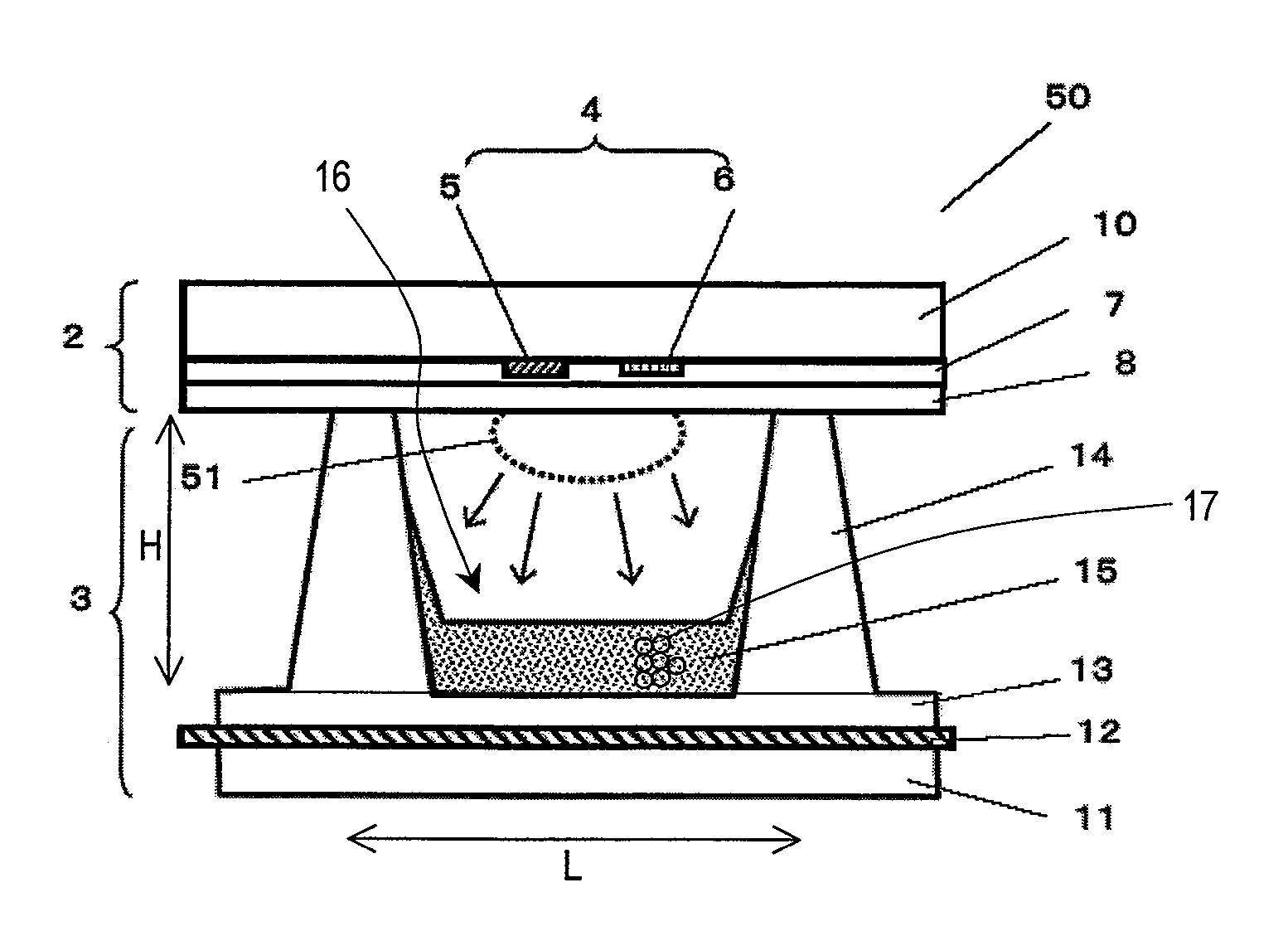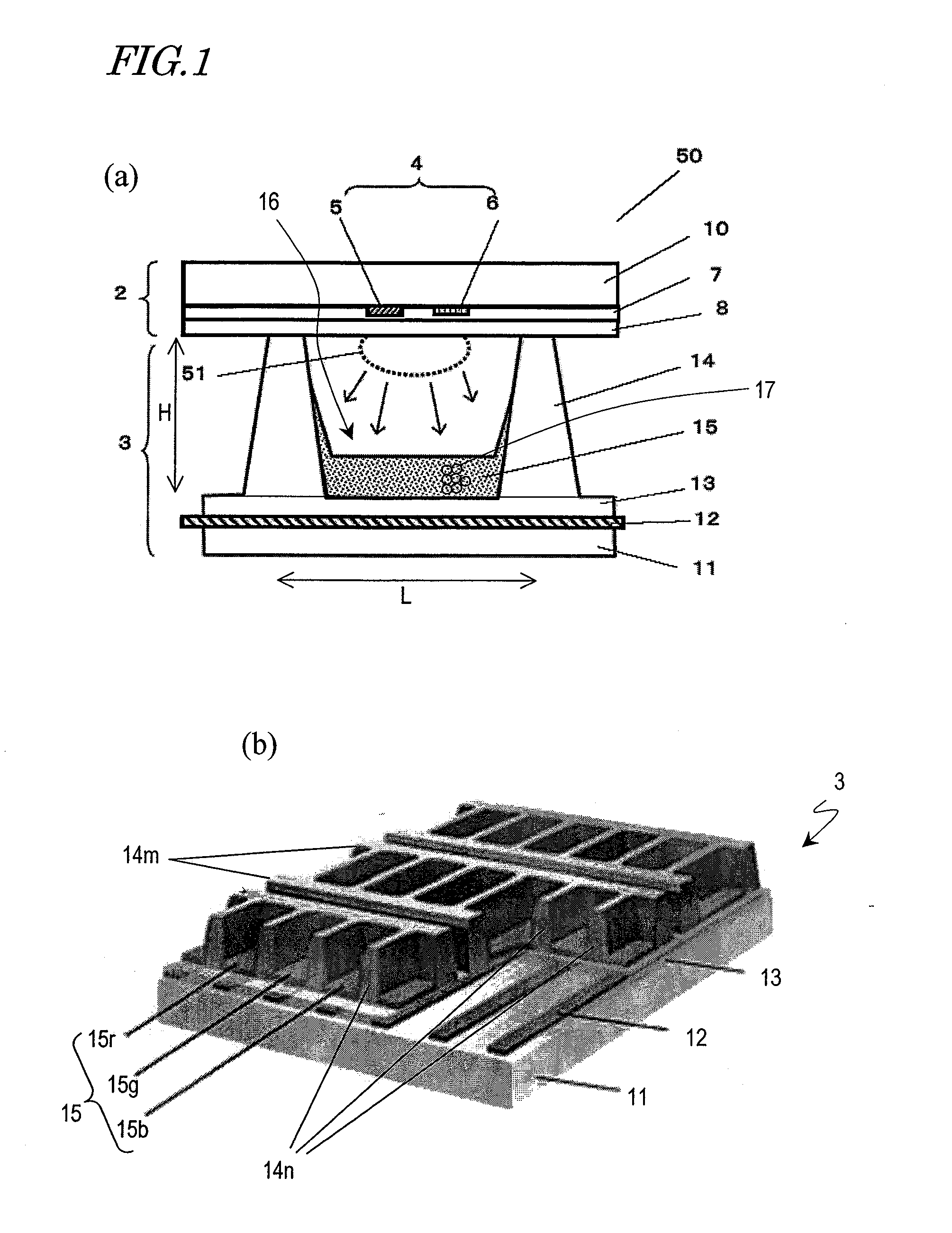Light emitting display device, plasma display device and phosphor particles
- Summary
- Abstract
- Description
- Claims
- Application Information
AI Technical Summary
Benefits of technology
Problems solved by technology
Method used
Image
Examples
example 1
[0146]Fluorescence particles were made by the method described above using the fluorescent material and organometallic compounds shown in the following Table 1. A retailed material was used as the fluorescent material. Xylene was used as a solvent to dissolve the organometallic compound, of which the concentration was adjusted in advance to 0.5 mol / L.
[0147]Next, 1.0 part by weight of fluorescence powder was mixed in the air with 0.2 parts by weight of organometallic compounds and 2.0 parts by weight of xylene as a diluent and the mixture was stirred up for about 30 minutes in a glass container. Thereafter, the mixture was filtered to separate fluorescence particles. Subsequently, the fluorescence was kept heated to about 150° C. and dried in the air for an hour. And then the dried fluorescence particles were loaded into a ceramic sheath and thermally treated at about 600° C. for 10 minutes in the air. This process step will be referred to herein as an “organometallic process on fluo...
example 2
[0181]The present inventors fabricated a plasma display panel using the fluorescence particles of the present invention and evaluated its characteristics.
[0182]Fluorescence particles in the respective colors of R, G and B were made by the method described above using the fluorescent materials and organometallic compounds shown in the following Table 2. Retailed materials were used as the fluorescent materials. Xylene was used as a solvent to dissolve the organometallic compound, of which the concentration was adjusted in advance to 0.5 mol / L.
TABLE 2Organometallic compoundAddedinpartOrganometallicNumberNumberSampleFluorescencebycompound andofofNo.R (red)G (green)B (blue)weightits amountmetalscarbonsB1(Y,Gd)BO3:Eu(Y,Gd)BO3:TbBaMgAl10O17:Eu1Al ethylacetate112diisopropylate(0.2)B2(Y,Gd)BO3:Eu(Y,Gd)BO3:Tb andBaMgAl10O17:Eu1Al acetoalkoxy128ZN2SiO4:Mndiisopropylate(0.2)B3(Y,Gd)BO3:Eu(Y,Gd)BO3:Tb andBaMgAl10O17:Eu1Al115and YVO4:EuZn2SiO4:Mnacetylacetone(0.2)B4(Y,Gd)BO3:Eu(Y,Gd)BO3:Tb andBa...
example 3
[0193]The present inventors added the organometallic compound with its concentration varied to find its preferred concentration. The results are as follows.
[0194]In the first specific example described above, samples were prepared by mixing together 1.0 part by weight of fluorescence powder, 0.2 parts by weight of organometallic compound, and 2.0 parts by weight of xylene as a diluent. In this specific example, samples were prepared with the amount of the organometallic compound added varied between 0.05 and 5.0 parts by weight as shown in the following Table 3, and variations in the emission intensity of the fluorescence particle irradiated with a vacuum ultraviolet ray (with a wavelength of 147 nm) before and after the ion bombardment were estimated. For this experiment, a blue fluorescence BaMgAl10O17: Eu and Mg octylate were used as a fluorescence and an organometallic compound, respectively.
TABLE 3AddedAddedininpartOrgano-partsNumberNumberSamplebymetallicbyofofNo.Fluorescencewe...
PUM
| Property | Measurement | Unit |
|---|---|---|
| Temperature | aaaaa | aaaaa |
| Temperature | aaaaa | aaaaa |
| Nanoscale particle size | aaaaa | aaaaa |
Abstract
Description
Claims
Application Information
 Login to View More
Login to View More - R&D
- Intellectual Property
- Life Sciences
- Materials
- Tech Scout
- Unparalleled Data Quality
- Higher Quality Content
- 60% Fewer Hallucinations
Browse by: Latest US Patents, China's latest patents, Technical Efficacy Thesaurus, Application Domain, Technology Topic, Popular Technical Reports.
© 2025 PatSnap. All rights reserved.Legal|Privacy policy|Modern Slavery Act Transparency Statement|Sitemap|About US| Contact US: help@patsnap.com



